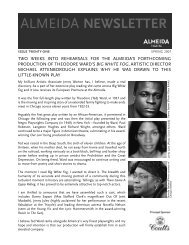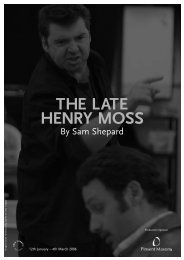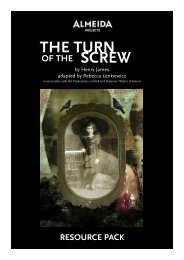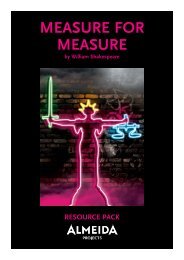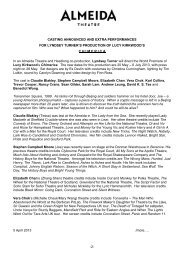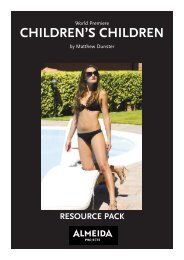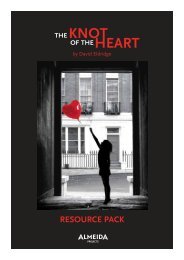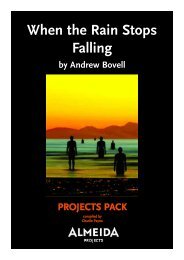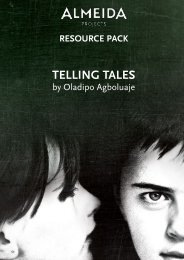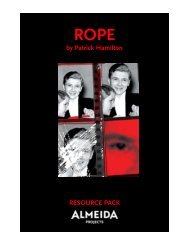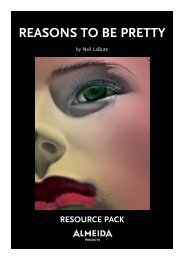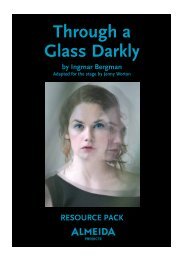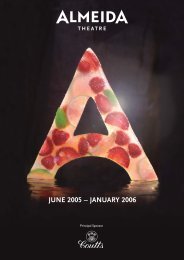Judgment Day - Almeida Theatre
Judgment Day - Almeida Theatre
Judgment Day - Almeida Theatre
You also want an ePaper? Increase the reach of your titles
YUMPU automatically turns print PDFs into web optimized ePapers that Google loves.
8<br />
Horvath in a radio interview on<br />
Bayrischer Rundfunk, 6 April 1932<br />
Since you received the Kleist Prize,<br />
newspapers and literary journals have<br />
been brimming with opinions about you,<br />
in fact I think it fair to say that no other<br />
modern playwright has enflamed the<br />
hearts and minds of the critics and<br />
divided them in quite the same way as<br />
you have. So it’ll be interesting to hear<br />
your opinions first hand.<br />
I can give you my opinions. And to save<br />
you the trouble of the first question, I’ll<br />
cut straight to telling you when and<br />
where I was born and whether I’m a<br />
thoroughbred German writer or merely<br />
some strange mixture.<br />
When asked if I’m German I can only<br />
reply: my cultural identity is<br />
undoubtedly German for the simple<br />
reason that German is my mother<br />
tongue. As far as I’m concerned, this is<br />
the determining element. Only then I<br />
would add the fact that I spent crucial<br />
years of my development in Germany, in<br />
Southern Bavaria and Austria. My name<br />
is Hungarian, I have Hungarian blood,<br />
Czech and Croatian too, so I’m a typical<br />
Austrian – Hungarian melange. But let<br />
me point out that the products of such<br />
racial mixing needn’t be the worst. It’s<br />
well known that many individuals of<br />
mixed race have been identified by later<br />
generations as the truest and greatest<br />
representatives of German culture.<br />
For example Nietzsche.<br />
Yes, he was half Polish for instance.<br />
And the painter and poet Albrecht<br />
Dürer was half Hungarian. But let me<br />
descend from these dizzying historical<br />
heights and get back to talking about<br />
myself. Let’s straighten this out: I<br />
frequently read articles describing me<br />
as a Hungarian writer. That’s utter<br />
nonsense of course. I’ve never written<br />
anything in Hungarian (apart from at<br />
school), only in German. That makes<br />
me a German writer.<br />
Anybody who is familiar with your work<br />
will be aware of your German, very<br />
Southern German style – even though<br />
you’re not a German national. Perhaps<br />
you could tell us where you were born?<br />
I was born thirty years ago in Fiume on<br />
the Adriatic coast. When I was thirteen<br />
I went to Munich and attended school<br />
there.<br />
Were you a successful student?<br />
Well, more or less. Actually, less.<br />
That was during the first years of the war.<br />
Yes, the war started while I was at<br />
school. When I think back on it today it<br />
seems I don’t remember the time<br />
before the war. I really have to<br />
concentrate to remember things from<br />
the peacetime before. I believe you<br />
and others of our generation will know<br />
what I mean.<br />
Yes, I certainly do.<br />
The World War darkened our youth<br />
and robbed us of our childhood<br />
memories. But let’s move on.<br />
Yes, let’s talk about the arts. Tell us Herr<br />
Horvath, how did you become a writer?<br />
In 1920 I was a student at the<br />
university of Munich and was as they<br />
say ‘interested in the arts’, but had<br />
never actually been artistically active in<br />
any way. Outwardly that is. Inwardly I’d<br />
been playing with the thought for a<br />
while and said to myself: why don’t<br />
you try to be a writer? You like going to<br />
the theatre, you’ve experienced a lot,<br />
you like to contradict, and above all<br />
you have this strange urge to write<br />
down the things you see and<br />
experience and the things you imagine<br />
others to see and experience. You also<br />
believe that you should never make<br />
concessions, and you’ve never been<br />
worried about what others say about<br />
you. And here we have all the<br />
trappings of what more flamboyant<br />
souls might call ‘the realisation of a<br />
poetic mission.’<br />
By chance I met the composer<br />
Siegfried Kallenberg one evening here<br />
in Munich in 1920. Kallenberg<br />
suddenly asked me: wouldn’t I like to<br />
write a pantomime for him. I was<br />
naturally somewhat puzzled since I<br />
couldn’t imagine why he should<br />
approach me of all people – I was not<br />
an author at all and had never in my<br />
life written anything. He must have<br />
confused me with someone else, I<br />
thought, and at first I wanted to<br />
correct him, but then I thought about<br />
it differently: why not have a go at<br />
writing a pantomime. So I agreed to it,<br />
got to work and wrote the pantomime.<br />
Later it was performed. I received my<br />
first review, I think you wanted to know<br />
about this?<br />
Indeed.<br />
It was devastating and started with the<br />
words ‘It’s a disgrace’ and continued<br />
in that vein. But I didn’t really take it to<br />
heart.<br />
So you decided to pursue writing as a<br />
career?<br />
Ah! I tried all sorts of more<br />
conventional jobs first, but I wasn’t<br />
suited to any of them. I must be<br />
destined to be a writer after all, I<br />
thought.<br />
Would you say your plays have a satirical<br />
element?<br />
I’m a big friend of satire. I can’t help it.<br />
I’d be interested in your thoughts on<br />
parody.<br />
I expressly reject parody as a dramatic<br />
form. Parody has nothing to do with<br />
art and is nothing but very cheap<br />
entertainment.<br />
Herr Horvath, let’s talk about our<br />
mutual passion: <strong>Theatre</strong>. I assume you<br />
will agree with me that the theatre will<br />
survive the present dire economic<br />
circumstances.<br />
<strong>Theatre</strong> as an art form cannot die, for<br />
the simple reason that people need it.<br />
For me this is a self evident and<br />
obvious fact. The theatre dreams on<br />
behalf of the spectator, and



